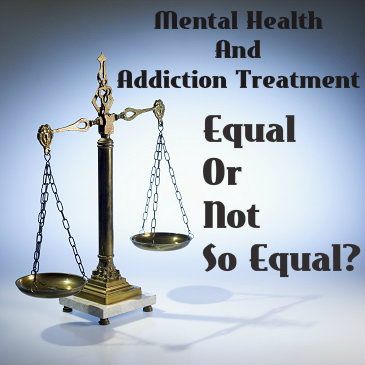Is Addiction Coverage Really Equal?
In recent years, two federal laws have guaranteed fair and equal coverage for mental health and addiction treatment. Those working in the field of addiction care are not so sure that the intent of those laws is really playing out in reality. People struggling with substance use disorders may not be getting the insurance coverage they need in order to get well.
The Federal Laws
In 2008, President Bush signed the Mental Health Parity and Addiction Equity Act. The law is supposed to ensure that health insurance plans are no more restrictive when it comes to mental health or addiction care than they are with other types of medical care. In other words, deductibles, co-pays and limits on treatment cannot be greater for mental health or addiction than anything else in the plan. The law does not require that plans cover these types of care at all.
President Obama’s Affordable Care Act added to the previous law by listing mental health and addiction treatment as essential benefits that must be covered by all health insurance plans, including those offered by small businesses and those for individuals. Prior to this law, most large company group plans included such coverage, but smaller plans often did not.
Equal Coverage Not So Equal
 The two laws signed by Presidents Bush and Obama were intended to make sure that people needing care for mental health issues or for addiction would get the treatment they need. One of the biggest barriers to getting treatment has always been cost. If an insurance plan does not cover treatment, or if the restrictions on treatment are significant, someone who needs help may not get it. Those who are in the field of treatment for addiction are finding that the laws’ intentions are not always playing out as intended.
The two laws signed by Presidents Bush and Obama were intended to make sure that people needing care for mental health issues or for addiction would get the treatment they need. One of the biggest barriers to getting treatment has always been cost. If an insurance plan does not cover treatment, or if the restrictions on treatment are significant, someone who needs help may not get it. Those who are in the field of treatment for addiction are finding that the laws’ intentions are not always playing out as intended.
The National Association of Addiction Treatment Professionals conducts ongoing surveys and has reported that there are many denials of coverage for addiction care. Behind more than half of those denials is a debate over what is medically necessary. Unlike other medical conditions, like heart disease for instance, medical necessity for addiction is not always perfectly clear. The insurance plans need not cover care that is not deemed medically needed. Caregivers cite the changing laws as the reason insurers are getting tougher about what they will and will not cover.
One of the biggest battles over care for addicts is the number of days of coverage for residential stays. Many insurers want to cap the stay at a week or less, while addiction experts insist that patients need up to three months of treatment. Some insurers insist that treatment need not be inpatient care and that they will cover a few months of outpatient care. What is right for each patient, though, is highly individualized. Some may succeed with outpatient treatment, while others have nowhere safe to go and really need a long stay in a residential facility.
The changing laws regarding care for addiction and mental health represent an important societal shift in attitudes toward those struggling with these very real medical conditions. The shift is positive and the laws help, but there are still many bugs to work out. As insurers debate how to implement coverage that meets the requirements of the laws, addiction caregivers try to pick up the slack. It may take more time to ensure that everyone gets the help they need, but the changes so far are just not enough to reach everyone.



